Weggenossen
Greece Travel Journal, part 2
(the first installment of this journal is here.)
3 June
Today, my husband went to his second funeral in two weeks. It was the third funeral for members of the same family in six months, and fuck if that’s not a lot.
I think about death a lot here in this village, much more than I’ve ever thought about death during the rest of my life. The village — and the Bëschkierfech on a hill above our home — are full of stories of the dead, and of the dead themselves.
The dead are my neighbors, and not just the ones buried in the ground.
There’s the one who hanged himself in the rafters of the house in which I live, my husband’s grandfather, though he’s a bit more a housemate than a neighbor. There’s the couple who died together in a blizzard in the forests above the house. They’d taken a wrong turn to get home, their car stalled and then stopped. Freezing to death, they got out of the car, laid on the ground next to each other, and died holding hands, and damn if that’s not how I’d like to go, too. And then there’s the woman who died in a car crash one hundred meters from the house, whose husband one year left an all-souls memorial but didn’t the next year, and so I do now instead.
My memorial for her is hardly the only memorial to the dead nearby, not even the only to the traffic dead. Not far from the nearby forest of the dead, just across from the house in which that couple who held hands as they froze to death once lived, stands a massive stone and metal structure called the Monument Aux Victimes de la Route.
Erected in 2016, the monument stands as a memorial to everyone who’s died either in a car or because of one. Of all the public sculptures I’ve seen, it’s one of the most profoundly effective and affecting. At the top are two very narrow rusting iron walls flanking a narrow path sloping down the hill to an array of standing pillars:
Walking through the narrow walls down the hill creates the sense of feeling both suddenly out of control and also directed, like what I imagine it must be life in the final moments before a speeding car crash. But at the end, when you reach the pillars, there is a sudden moment of solace, the sort which comes from quiet resignation of an unavoidable fate.
Death is absolutely everywhere here, and so are the dead, and it’s always on my mind in a way it’s never been in my life. For most of my past, I struggled almost angrily against the idea of ancestor veneration, or even ancestors altogether. This happens often, I think: many of us, especially with so much effort marshaled towards interrogating or fully rejecting the past, have trouble even imagining any sort of positive connection to our own dead.
In fact, I didn’t start regular rituals of ancestor veneration until moving to this village. I’d occasionally feel my dead great aunt “around,” and I’d smile and say hello to her, but I was quite afraid of doing much more. It wasn’t that I didn’t want to keep relating to her, but rather I was afraid of who else might show up once I made a space for her.
My grandfather was the next to show up, and really quickly. Occasionally, I’d leave out a portion of his favorite meal whenever I made it, putting it in a small dish and leaving it outside. Then, I started leaving it inside, like I was courting a feral cat who’d anyway been more than willing to come inside and was just waiting for me to leave the door open. Then, a friend died, and suddenly I was talking to her, and then my grandmother, and now there’s a lot of dead people hanging around. Once you start talking to specific dead, others notice and would like to maybe have a chat too.
Still, I didn’t really understand why this all started for me here, and why even thinking about the dead became such a normal thing, until I mentioned this to a dear friend, who arrived on Saturday for a two night visit. I’d told her it seemed there was so much death here, and so many dead, and she shook her head.
“It’s the same everywhere, you just notice it more here. When someone dies here you’ll know it, because everyone knows everyone.”
She was correct, of course. We do all know each other, even if we’ve never met. Luxembourg is so small, and these villages are so tiny, that the degrees of separation between people are often no more than two. Unlike in a city, where someone can die and no one would know, if someone dies here I’ll know it, because someone I know will have known them.
For example, the woman who died in a car crash near our home was the mother of a friend of my husband. He didn’t know her well, but she had always been kind to him and even, the night before her death, wrote him a short text message. She’d seen him on television — as has most of this country — and wanted to say how proud she was of him.
The last line of the text to him that night before, 10 hours before she’d died, were “take care of you.” He cried when he learned it was her who’d died, and I held him as he cried, and those words became to him like an oracular blessing from beyond the grave.
The dead do that. They leave us tragedies and sorrows and stories that don’t feel finished, yes, but they also leave us gifts. And now I leave her gifts, a small winter memorial each year where her car hit a tree. I never knew her, but my husband did and so I did. She told him to take care of himself, “take care of you,” and when I watch him learn better to do this, gratitude for the dead and their presence is the only response I could ever have.
It feels important that the dead feel so around just before this journey. I don’t yet know why, but I’m sure I’ll find out.
4 and 5 June
I’d spent much of the weekend trying to prepare my things and itinerary for this trip, while trying to write an essay, while trying to organize things for the house while my husband and I are gone, and then I hosted a dinner party for eight people.
Each time before a trip I tell myself I won’t do this, but then each time before a trip I do exactly this. I fill up all my time, do extra things I don’t really “need” to do, and get myself quite frazzled and exhausted before I finally leave. But watching how my husband does something very similar, and trying to figure out why he’d take on so much at the very moment that the stress is at its highest, I finally understand why I do the same thing.
It’s so obvious that I could never see it until I saw that he does it. It’s something we need to do, and something we used to understand needs to be done, and something we still sometimes acknowledge we must do. We once knew this: before rituals of initiation or life change, you need to tire out the parts of you that need to control everything, so that losing control feels relieving. It’s just like before a wedding. You get both of the betrothed drunk, and tired, and distracted, and so stressed that, by the time it actually happens, neither of them have enough energy to even try to direct anything any more.
That’s definitely why I did all that. I fill all the time before, exhaust myself, do even more than usual, so that, by the time I get on the plane tomorrow, the journey will feel like blissful surrender and release.
Unfortunately, being so busy, I don’t feel I had enough time with my visiting friend, nor with my husband, and especially not with myself. And I’m quite fucking tired. My work has exhausted me, both the work I do for money and the work I do for life. That latter kind of work’s been honestly the hardest lately, holding up others around me whose own lives are too heavy for them. Sometimes, it’s all so exhausting I’d like to not do any of it for a while.
6 June
There’s a German term I’ve loved since I heard it: weggenossen. It’s used to describe someone you meet on a journey, and was first given meaning by the anti-industrial youth movement called Wandervögel. Weggenossen literally means “way-known,” though it’s usually translated less accurately as “fellow traveler.” The word specifically speaks to the encounters you have with strangers who become, at least while you are sharing the same path, a kind of companion or friend.
Though I never met him, I’m sure it’s the right word for the man I watched scribbling with such delicious zeal in his journal. I couldn’t help but watch him, because the delight and fervor with which his pen attacked the blank pages before him was exhilarating. He’d smile, and then write more. He’d scratch his beard, and then write again. A few times he stuck his tongue out to the side of his mouth, as if tasting the air around him for an idea hanging there, and then he wrote again.
He was fantastic to watch. We were in Athens, waiting for a flight to the island of Kos. I don’t know who he is, nor what he was writing, but I found myself intimately involved with his intense, desperate, ecstatic need to write.
Our plane was late, and he really didn’t seem to care. More time to scratch his head with the pen, and then use it to ink words he’d been looking for there in his curls. More time for more ideas, more expression, more euphoric inscriptions.
I imagine I’ve been him myself. Maybe not quite as beautiful as he was, perhaps not as unconscious of the joy expressing itself through every movement of the body as he evidently was, but he felt somehow kin.
I’m so glad to be traveling, but I’m still not fully able to leave the stress of normal life behind. I’d not managed to finish some significant work in the previous days, wasn’t certain I’d planned all the contingencies correctly. Also, I was worried for my husband, who’d gotten a infection on his foot just the night before I left. He wears suits for work, and dress shoes meant to show everyone that you are “too professional” to care about your feet. “Fashion hurts,” as he’d sometime say, and I’d shake my head, sadly, thinking nothing you wear should ever hurt.
All this exhausted me, but watching this man, another writer, a kind of weggenossen, made me less tired. I felt alive watching how alive he was, pouring out thoughts on paper, flooding pages with them. I have no idea what he was writing, but he wrote it with such passion that I can only believe the words were pure magic.
The flight from Athens to Kos was in a small plane, not so small to need propellers but small enough you feel flying more than a larger jet. I had a window seat, and stared through it almost the entire flight, enthralled by the Mediterranean and the countless islands passing by beneath us. I’d never seen a vision from the sky so beautiful, except perhaps the way the mountainous parts of Newfoundland fall away suddenly into the Labrador sea.
The only times I didn’t watch out the window was when I glanced at the writer, sitting quite close to me, still writing.
We landed soon after we took off, and I was in Kos. Two other participants of the event were waiting for me at the airport, Jeff Key and Thordis Elva. Jeff’s a hairy and muscular ex-marine American, a playwright, poet, and a big ‘ol queen the sort of which the woke have tried to make extinct. Thordis is an elvish Iceland activist, poet, and playwright best known for her 10-million-view TED talk on sexual assault and forgiveness. The vision of those two together was a bit like seeing an orc and an ice sprite, both waving at you from the arrivals section.
From there we got a taxi to the other side of the island, the city of Kos, where our ferry would depart. Standing in the queue for the cab, I caught a final vision of my weggenossen, the writer, just at the moment he caught vision of a man there to meet him. What passed between them is something I’ll not soon forget. Perhaps they were brothers, longtime friends, even lovers. It was impossible to tell, because that much delight in meeting each other looks the same in all three cases.
Arriving some 45 minutes later in Kos, and with another two hours to while away before our ferry to Patmos, we settled on a restaurant where, immediately upon arriving, we learned several others coming with us to Patmos were waiting.
Thus I was able to first meet
, who, tired, quite unkempt, wearing a Johnny Cash t-shirt, had an anti-cold nasal suppository up one nostril and still managed to be charming. I suspect many years from now, I’ll still it find this to be my favorite vision of the man. I ate while mostly listening to the conversations of the others. I didn’t feel the need to say much, nor do I still, a deeply welcome internal silence I’ve been trying to cultivate. And anyway, I was quite travel worn myself.It was finally time for the ferry, the final journey to Patmos. We walked along the coastline of Kos, greeted by countless feral cats, to the port. Our ship was quite massive, just arriving and disgorging passengers, cars, and the especially crucial trucks. None of the Dodecanese Islands (which, despite the name meaning “12” in Greek, comprises some 165 in total, though only 26 are inhabited) can fully support its population on its own. Thus, goods are shipped on trucks ferried between the islands and the mainland several times a day.
We boarded, and everything gets a bit difficult to understand after this. I remember us all setting our stuff down in one of the lounges, and then I immediately all but ran to the deck. As I’d mentioned, I needed to watch the sea, needed to be in the middle of the ocean, needed a bit (I initially thought) to be alone. The others mostly sat inside, but then trickled out slowly, joining me for a little while and then heading back inside.
I spent those hours staring into the darkness, listening to the rhythmic engines of the ferry, half-dreaming and half-awake. I was soon joined by Thordis, whom I find myself quite fond of. I “felt” her coming behind me, turned, and she was there, offered her a chair, and we talked quite extensively.
Others joined for short spaces and then left, and at some point I found I couldn’t really listen anymore. Rising just over the horizon was a blood red moon. It seemed profane to speak about it, to tell them to look at it, so I just pointed my finger, waiting patiently for the others to notice it too.
And then we were in Patmos.



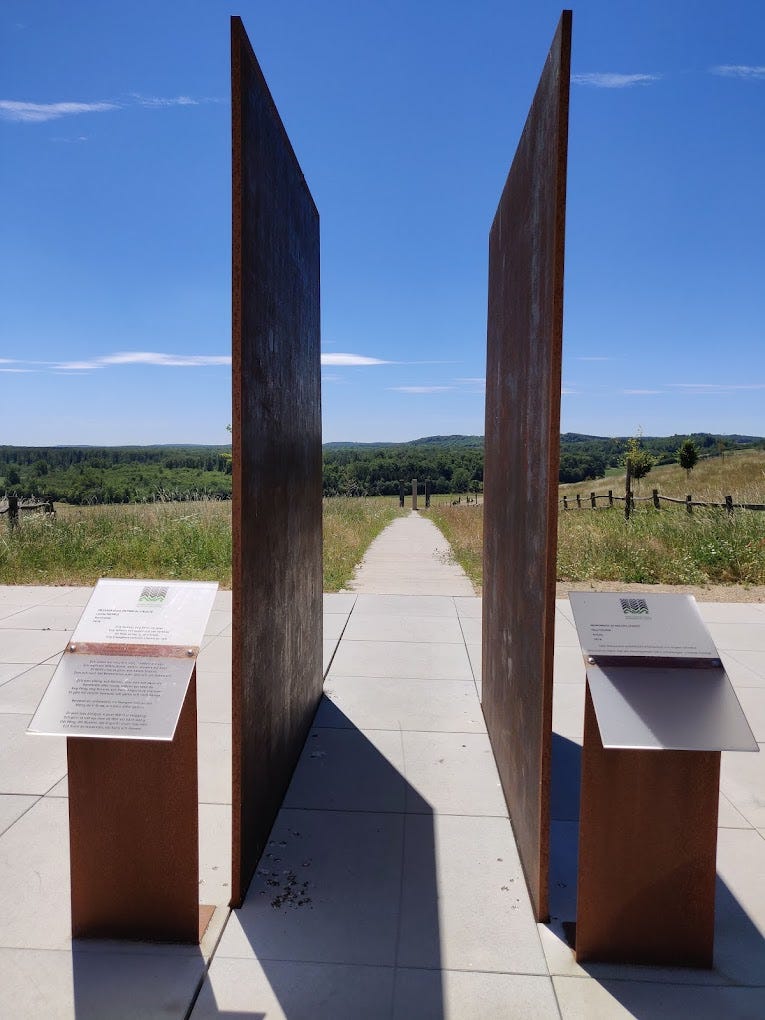
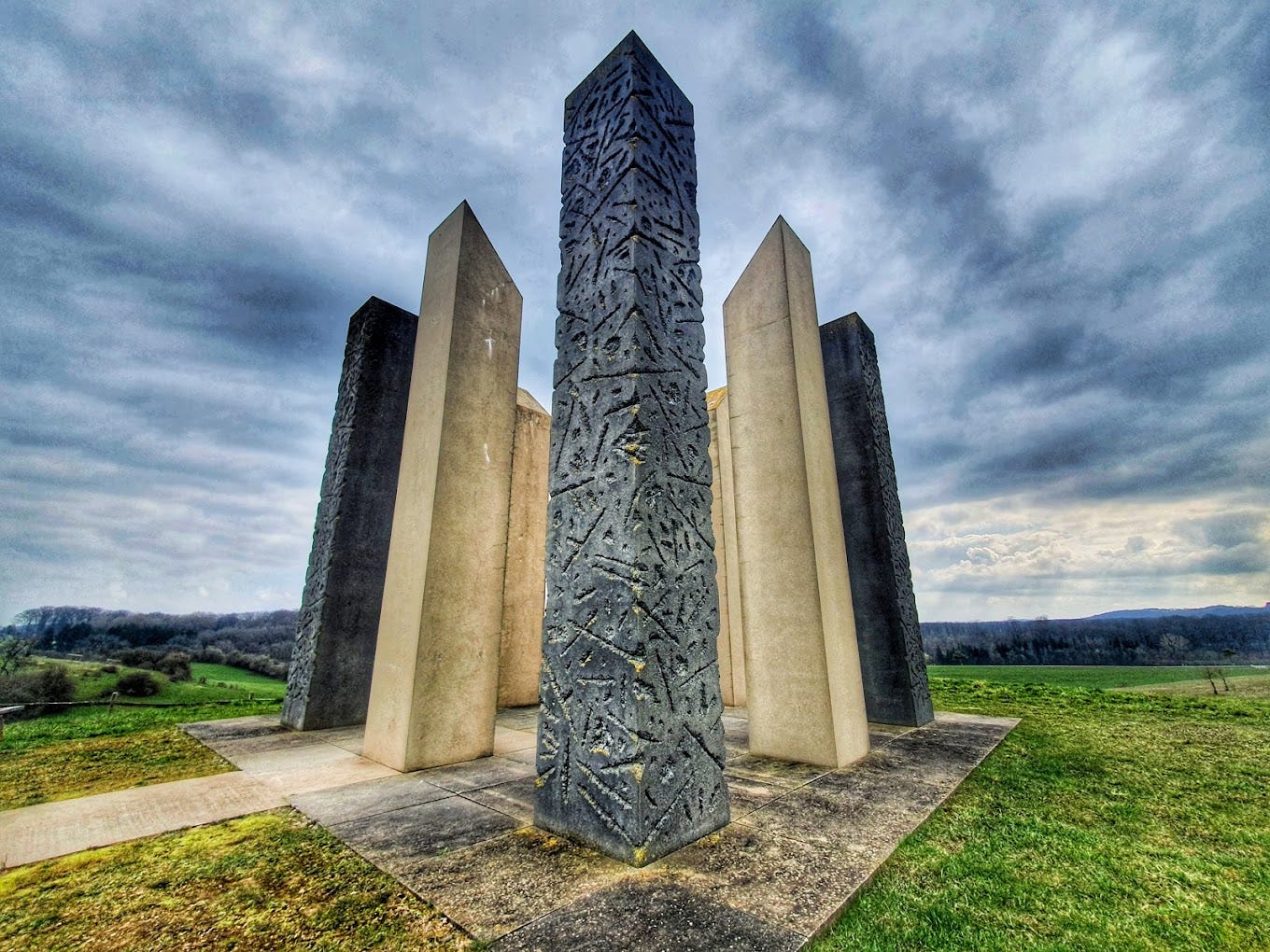
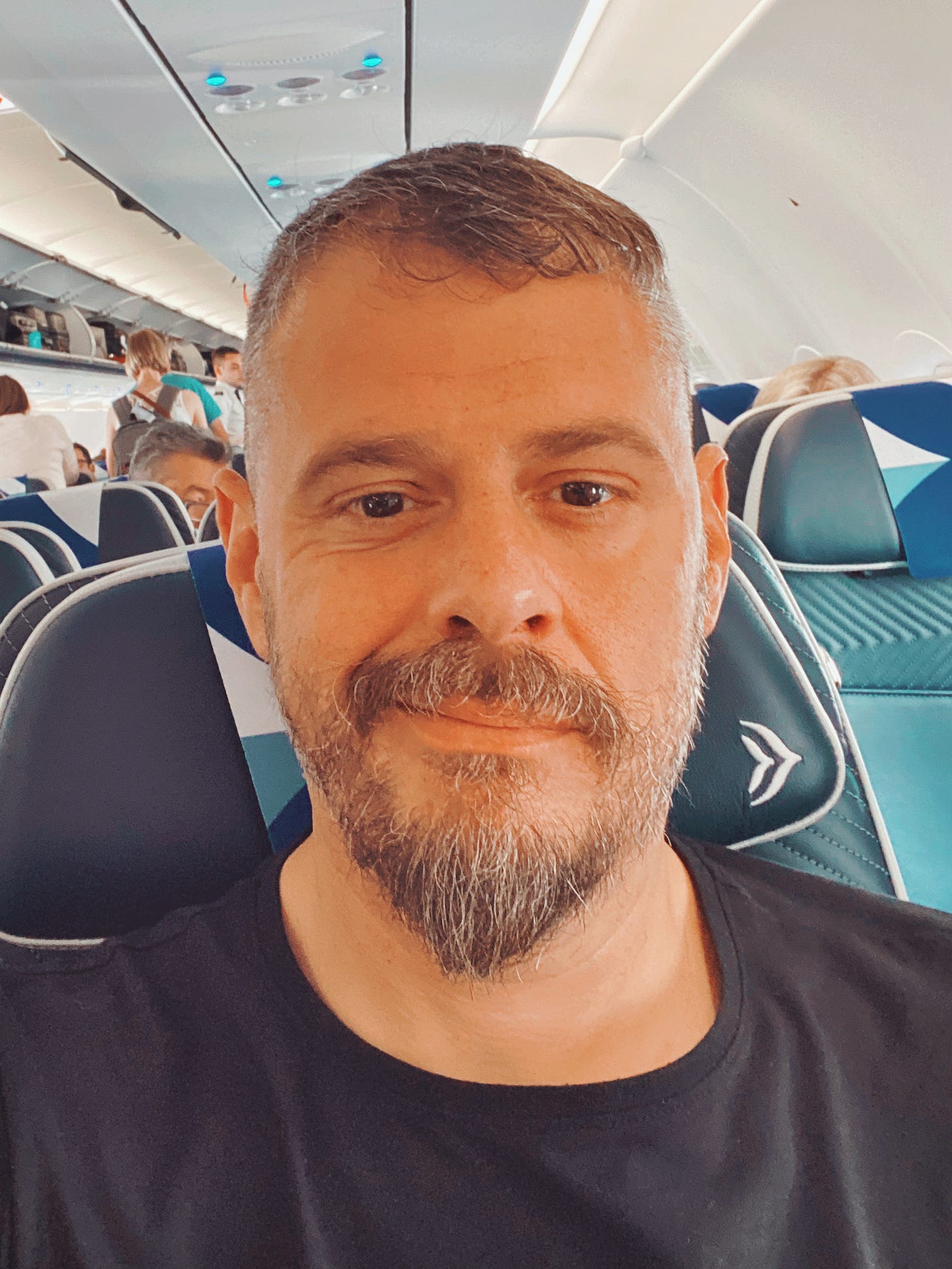
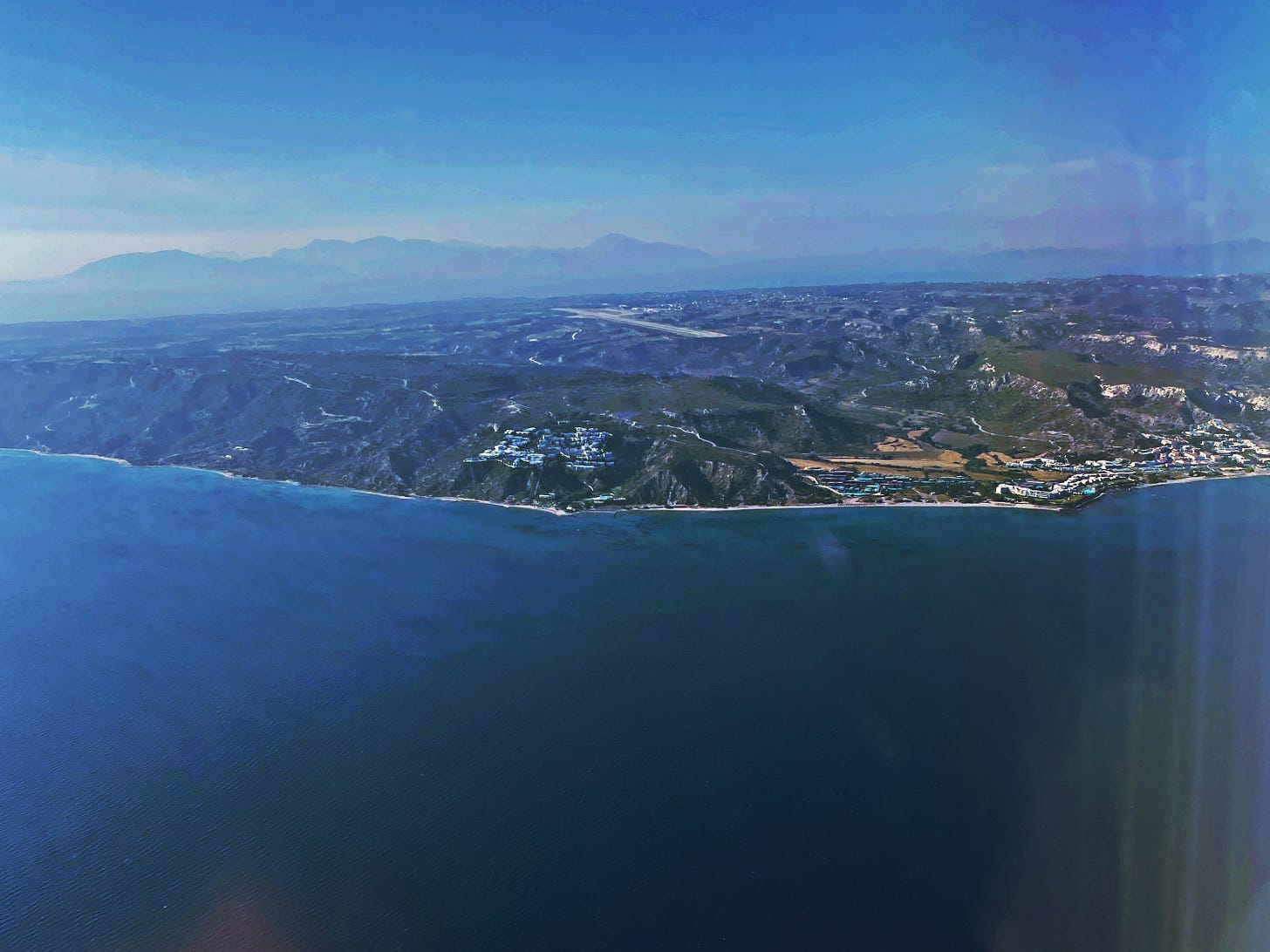
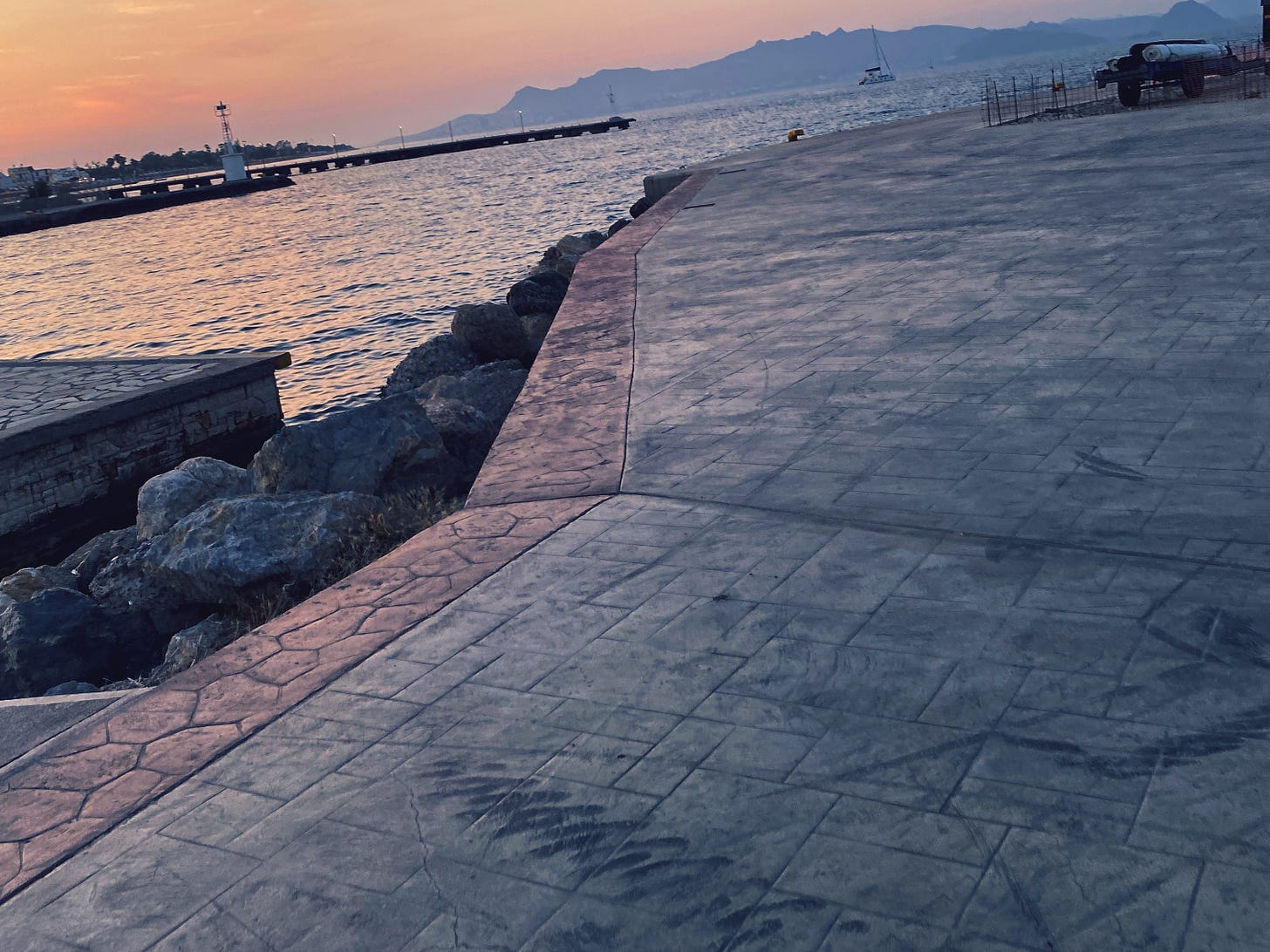
With my ancestors, I worry about disappointing them more than I feel like rejecting them TBH
So that’s something I need to get over, especially lately
The idea of exhausting oneself before having to make a major transition is something I've never thought about , but looking into my own life it actually makes a lot of sense! Also cool to learn about the word "weggenossen." The first part of my last name (at least the way my ancestors spelled it when they lived in Europe) used to be "Wegge" so reading about this actually pulled me further down a little path I was going on in terms of exploring things about my own ancestors.